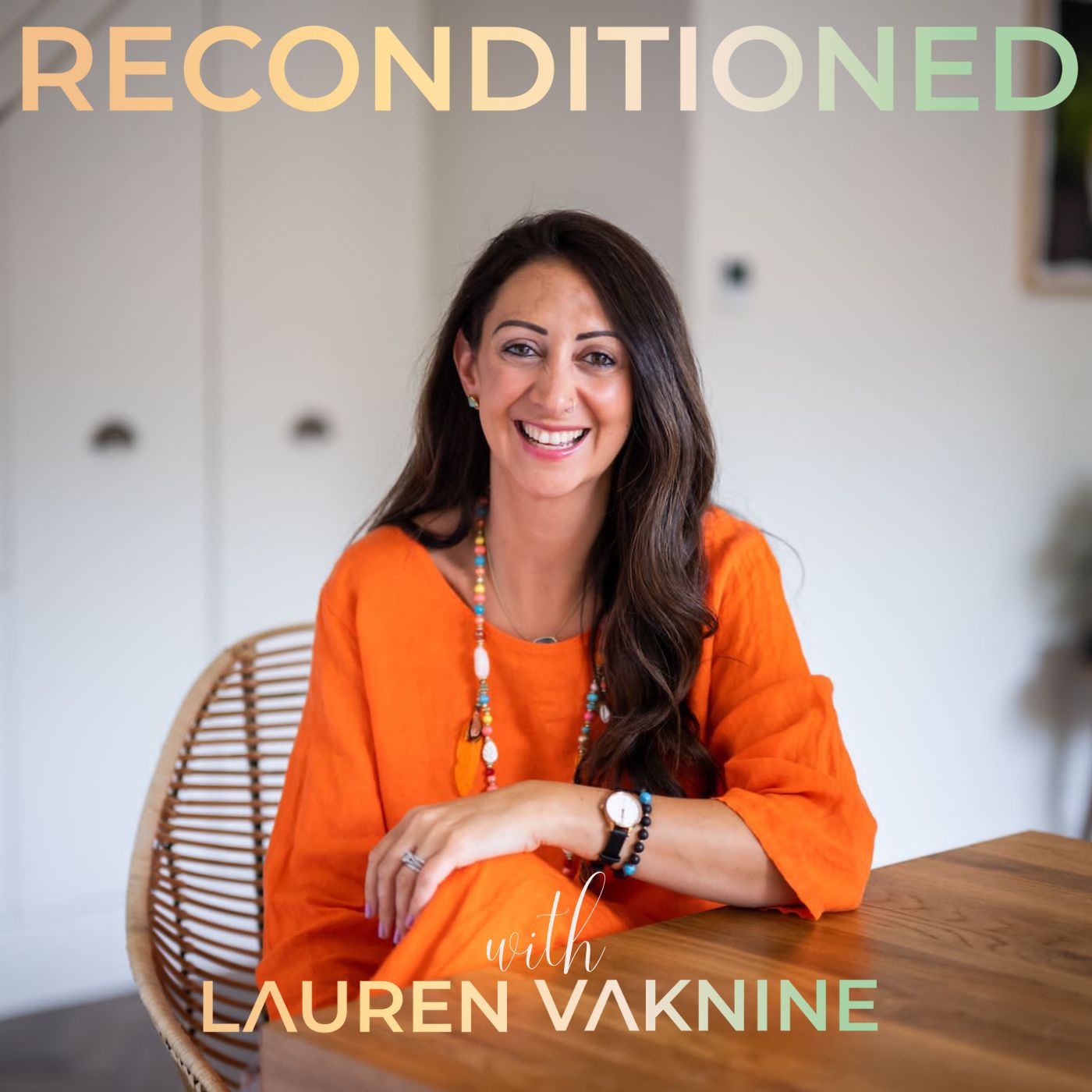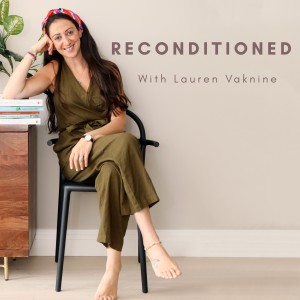
290.8K
Downloads
176
Episodes
Where wellness becomes a way of being.
Reconditioned is the podcast for wellness seekers ready to rise—physically, emotionally, mentally, and spiritually. Hosted by master holistic health & life coach, wellness expert, speaker, and former wheelchair user Lauren Vaknine, this show cuts through the noise of wellness trends to bring you grounded, integrative and genuine holistic guidance for true, lasting transformation.
After healing herself from the juvenile rheumatoid arthritis she'd had since infancy that left her wheelchair-bound by 18, through deep self-study and holistic living, Lauren has made it her mission to help others recondition—to return to their most empowered, vibrant selves.
Whether you’re navigating chronic health challenges, raising conscious children, or simply craving a more aligned, fulfilling life, this podcast is your weekly dose of inspiration and actionable insight. Expect expert interviews, solo episodes, and soulful conversations that bridge science, spirituality, and self-mastery.
Because wellness isn’t a destination—it’s your foundation for everything.
Listen now on Spotify, Apple Podcasts, or wherever you get your podcasts!
If the podcast resonates, please rate, review, and share—it helps this message reach more people who need it!
Where wellness becomes a way of being.
Reconditioned is the podcast for wellness seekers ready to rise—physically, emotionally, mentally, and spiritually. Hosted by master holistic health & life coach, wellness expert, speaker, and former wheelchair user Lauren Vaknine, this show cuts through the noise of wellness trends to bring you grounded, integrative and genuine holistic guidance for true, lasting transformation.
After healing herself from the juvenile rheumatoid arthritis she'd had since infancy that left her wheelchair-bound by 18, through deep self-study and holistic living, Lauren has made it her mission to help others recondition—to return to their most empowered, vibrant selves.
Whether you’re navigating chronic health challenges, raising conscious children, or simply craving a more aligned, fulfilling life, this podcast is your weekly dose of inspiration and actionable insight. Expect expert interviews, solo episodes, and soulful conversations that bridge science, spirituality, and self-mastery.
Because wellness isn’t a destination—it’s your foundation for everything.
Listen now on Spotify, Apple Podcasts, or wherever you get your podcasts!
If the podcast resonates, please rate, review, and share—it helps this message reach more people who need it!
Episodes

Sunday Jan 05, 2020
Sunday Jan 05, 2020
In this Healthy Happy Home Mini-sode, we answer the question, is eating organic really that important and how can we find ways to manage it financially?
When we were researching how to make this podcast the best it could possibly be, and unique to us and our message, we realised that there are certain topics when it comes to holistic living that people really want easy and accessible information for. To that end, we decided to offer 6 “mini-sodes”: short, micro-episodes that answer your most burning questions when it comes to holistic living and parenting.
And in a bid to give our valued listeners access to as much free information as possible to help you attain the level of holistic living that you are reaching for, we decided to offer you the entire transcript of each mini-sode, so you can access this information quickly and easily. Read on below our contact information.
Please head to the website www.healthyhappyhome.uk to read more about us, and to sign up for our free 6-step guide to living your healthiest, happiest life. You can also find us on Instagram @healthyhappyhomepodcast @laurenvaknine @tillywood. Use the Hashtag #elevationnation to connect with us.
Don’t forget to rate, review and subscribe / follow!
Season 1 of Healthy Happy Home is sponsored by Megahome Water Distillers www.megahome-distillers.co.uk @megahomedistillers1
Is Eating Organic Really That Important And How We Can Find Ways To Manage It Financially (Clean 15, Dirty Dozen) – Transcript:
Quite simply, the answer is yes, it is pretty important. But there are ways around it to make it more financially viable. First, let’s delve into why it’s important to eat organic.
Anything that isn’t genuinely organic contains harmful toxins. In our grandparents’ time, food was grown or reared naturally. Now, however, all non-organic fresh food is grown using pesticides and insecticides, animals being reared for food by non-organic farmers are injected with growth hormones, antibiotics and steroids, not to mention that the environments they’re raised in are appalling, and all processed food is made using preservatives, hydrogenated fats, transfats and other harmful, non-foods.
Our livers are getting so tired trying to detoxify us from all the toxins we consume in our modern lives, and when the toxic load gets too high and our livers can no longer take it, onset of illness can occur. This is why it’s important to keep our toxic loads to a minimum, by reducing exposure to toxicity, and though we can improve this in so many aspects of our lives, one of the best ways of doing that is through nutrition.
What’s the trick? There isn’t one. It really doesn’t have to be complex or thought about too much. JUST EAT REAL FOOD. Naturally produced, homecooked and seasonal are the best ways to go.
And the way to manage it financially? Stick to the clean 15, dirty dozen theory. There are some fresh foods that you can get away with not eating organic, if you do have to choose. These are usually foods with thicker skins, as the pesticides don’t penetrate as deeply. These are called “clean 15” and they are as follows:
- Avocados
- Sweet corn
- Pineapples
- Frozen sweet peas
- Onions
- Papayas
- Eggplants
- Asparagus
- Kiwis
- Cabbages
- Cauliflower
- Cantaloupes
- Broccoli
- Mushrooms
- Honeydew melons
On the flipside, fruit and veg with thin or no skins, will retain a higher percentage of pesticide residue, these are known as the dirty dozen, and they are as follows:
- Strawberries
- Blueberries
- Spinach
- Kale
- Nectarines
- Apples
- Grapes
- Peaches
- Cherries
- Pears
- Tomatoes
- Celery
- Potatoes
A quick note on fruits that are labelled as organic but still available out of season. The loophole is that they are grown organically, but perhaps in another country, and then sprayed with preservatives to keep them fresh for the journey, so they end up being far from organic. This is why seasonal eating is important.
Our bodies respond to what we put in and on them, we are not invincible. We need to fuel our bodies with the fuel that is conducive to wellbeing and a lighter toxic load. Just remember, if your grandparents wouldn’t have been able to get hold of it, it’s a good indicator. Eat real. Eat clean.
But hey, as my mum always says, a little bit of what you fancy does you good. Try and live by an 80/20 rule, and that way you’re not restricting yourself to an unmanageable lifestyle, because life should be enjoyed!

No comments yet. Be the first to say something!